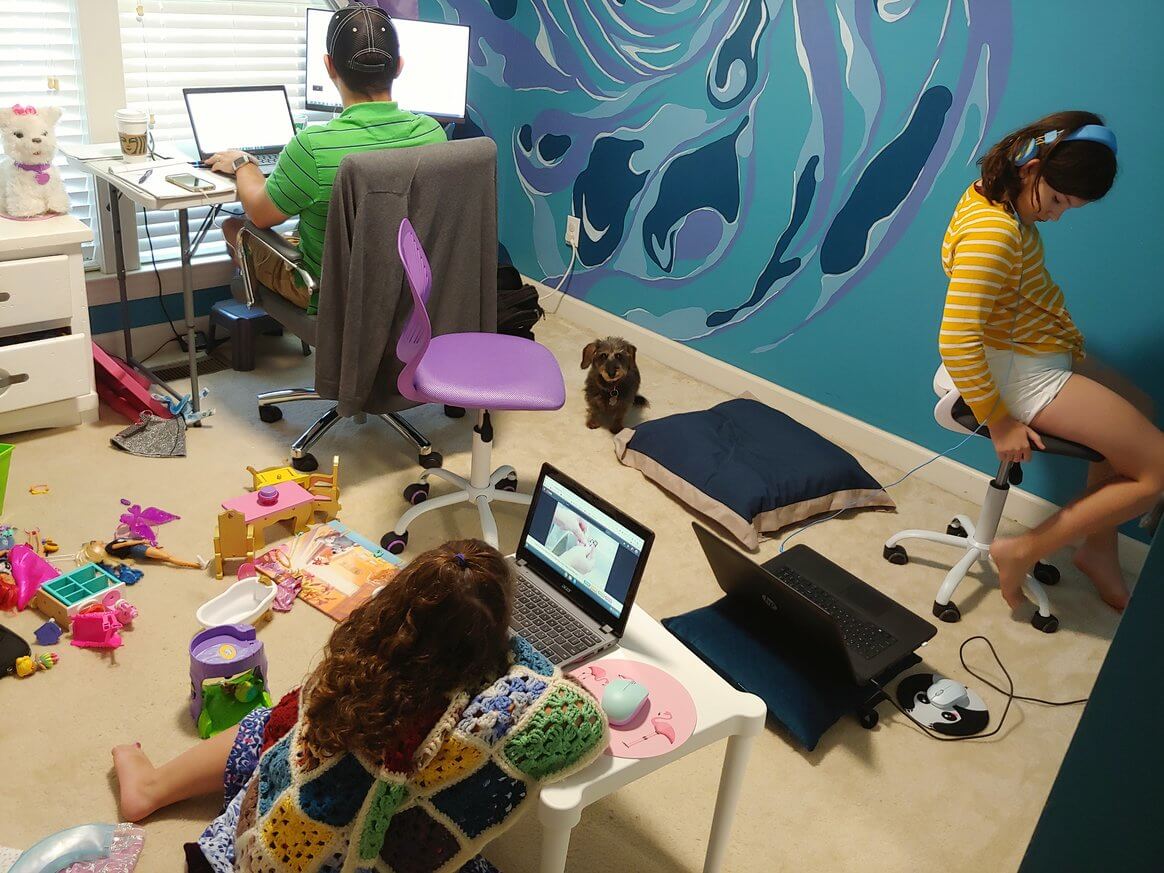By
Erica Mancuso
|
Date Published: August 31, 2020 - Last Updated August 28, 2020
|
Comments
 With the new school year just ahead, many working parents are wondering how to simultaneously meet their business commitments and ensure their kids are learning successfully from home. After all, obligations to clients must be met regardless of whether the kids need immediate help with their math lessons.
With the new school year just ahead, many working parents are wondering how to simultaneously meet their business commitments and ensure their kids are learning successfully from home. After all, obligations to clients must be met regardless of whether the kids need immediate help with their math lessons.
As a leader, you may be facing this challenge yourself, but also thinking about the needs of your employees. We know that having kids learning at home could be a source of hardship and additional stress for you or your employees. Every situation a working parent will face will be unique, and some parents may be able to easily balance the competing priorities, while others will struggle. Now is the time to check-in with your employees to understand their needs, make any necessary adjustments, and develop a plan to help everyone involved navigate the next several months.
Establish a routine
With this unprecedented blending of work and life, routines may not be bound by the traditional 8 am - 5 pm workday. Nonetheless, set a routine for yourself and your employees - and stick to it as best you can. A routine will help your employees and your kids know when you are available. Likewise, you will know when your employees are available.
Try to understand what other demands will be placed on your employees’ time and determine if any adjustments to their schedule should be made. Granting flexibility can be difficult when running a contact center, but look for the opportunities. Some employees might be most productive by starting earlier or working later and taking a longer than normal lunch break at 10 am to help with schoolwork. Perhaps other employees shift from the phones to working tickets later in the evening.
Once you have a schedule sketched out, check in with your employees frequently. What they think they need going into the school year could change after they have a few weeks of school under their belts.
If you are offering more flexibility, keep fairness in mind and offer the same flexibility for all employees, regardless of parental status. You cannot expect other employees to pick up the slack.
Be nimble
Now more than ever, there will be days that do not go as planned. An unfortunate reality right now is that some days will be more productive than others.
Create a “Plan B” for when the unexpected happens. Are there certain tasks, meetings, or projects that can be deprioritized to ensure employees get their most important work done? Determine how employees can make up missed time when their day goes awry due to an issue at home. If they cannot, be clear about that, too.
Communication is extremely important, especially when things are not going as expected for you or your employees. Be sure to check in with your employees frequently to understand potential needs and challenges, and also communicate your status to your team.
Redefine expectations
Perhaps expectations need to be adjusted as a result of the current situation. Being clear about this will help your employees, your customers, and your family know what they can expect of you. Additionally, you must clearly articulate your expectations of them.
Employees might show up for video calls with a child on their lap, or they may have a young child doing schoolwork right next to them, leading to possible background noise while helping clients via phone. How will you react to this? These situations could make employees uncomfortable even though they have no other choice. If this is ok, let them know ahead of time.
Set some age-appropriate expectations with your children, too. Create a sign or symbol to communicate when you cannot be interrupted. If they are old enough to be self-sufficient, have them get their own breakfast, lunch, and snacks (and clean up, too – who needs that middle school home economics elective?). Plan to check in with them at certain times throughout the school day and answer questions. More lengthy help can often wait until the evening.
Keep your commitments
Someone recently tweeted their frustration over a canceled meeting. While we generally love the additional 30 to 60 minutes of time back, it’s important to recognize that employees may have scrambled to arrange childcare for that time so they could be fully present for the meeting. Be respectful and try to avoid last-minute changes.
Take care of yourself
Now is not the time for you nor your employees to neglect self care. With the extra demands placed on employees and parents, it might be hard to carve out time for this, but consider it a small investment that can help pay dividends for your mental state. As a contact center leader and/or a parent, many people count on you to be at your best. There will be days when you’ll need extra patience and grace, but taking care of yourself will help you when you need to dig deep.
Self-care doesn’t need to be extravagant. It could be as simple as a meditation or yoga app, or just something in your workspace that makes you smile. Or perhaps it’s a lunchtime walk or some quiet time for yourself first thing in the morning. And use your PTO, even if it’s for a staycation. Whatever works for you, schedule it, and treat it like a meeting. Similarly, your employees may also be juggling multiple demands, so encourage them to find ways to invest in their self-care and use PTO, too.
Leading both employees and children through these unchartered waters is hard. Be gracious to yourself, your family, your employees, and your customers.